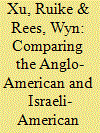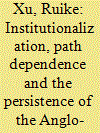| Srl | Item |
| 1 |
ID:
152033


|
|
|
|
|
| Summary/Abstract |
This article juxtaposes two of the most influential yet under-studied America watchers within the top echelon of the Chinese Communist Party (CCP), Wang Huning and Zheng Bijian. To be sure, the two have indelibly shaped CCP attitudes, yet surprisingly enough, although Zheng has been written about extensively in the English language, Wang has hitherto largely remained outside academics’ purview. This article also aims, in passing, to explore linkages between Wang and Zheng ideas and those of other well- known America watchers like Liu Mingfu and Yan Xuetong. The comparison offers clues as to the extent to which the current advisory shaping CCP thinking on the US differs from the previous generation, and as to whether CCP thinking is un-American or anti-American in essence. The conclusions ties the study together by arguing, based on Wang and Zheng's views, that New Confucianism may shape Chinese society in the future
|
|
|
|
|
|
|
|
|
|
|
|
|
|
|
|
| 2 |
ID:
159376


|
|
|
|
|
| Summary/Abstract |
The Anglo-American and Israeli-American special relationships have proved to be unusually close and have confounded expectations that they would wither away with the changing international environment. In order to explain this, the article proposes a theory of ‘alliance persistence’ that is based on reciprocity over shared geostrategic interests, sentimental attachments and institutionalised security relations. The article employs this theoretical framework to explore how Anglo-American and Israeli-American relations have developed during the Obama administration. It argues that the Anglo-American relationship has been closer because of the two countries’ shared strategic interests, whilst the Israeli-American relationship has experienced divergences in how the security interests of the two sides have been pursued. The article concludes by assessing how the two relationships will fair in the post-Obama era and argues that there are numerous areas of tension in the US-Israeli relationship that risk future tensions.
|
|
|
|
|
|
|
|
|
|
|
|
|
|
|
|
| 3 |
ID:
148461


|
|
|
|
|
| Summary/Abstract |
One of the remarkable phenomena in post-Cold War world politics is the persistence of the Anglo-American special relationship (AASR) in spite of recurrent announcement of its death by pessimists. Current scholarship on Anglo-American relations largely draws on interests and sentiments to explain the persistence of the AASR, ignoring other important contributing factors such as institutionalization. This article is the first to give serious consideration to the role of institutionalization in influencing the persistence of the AASR. By using the concept of path dependence, this article argues that the high-level institutionalization in Anglo-American intelligence, nuclear and military relations plays a seminal role in contributing to the persistence of the AASR in the post-Cold War era. The institutionalized intelligence relationship is exemplified by the relationship between the UK's Government Communications Headquarters (GCHQ) and the US's National Security Agency (NSA), which is underpinned by the UKUSA Agreement. The institutionalized nuclear relationship is exemplified by a variety of Joint Working Groups (JOWOGs), which is underpinned by the 1958 Mutual Defence Agreement. The institutionalized military relationship is exemplified by routinized military personnel exchange programmes, regular joint training exercises and an extremely close defence trade partnership. The high-level institutionalization embeds habits of cooperation, solidifies interdependence and consolidates mutual trust between the UK and the US in their cooperation on intelligence, nuclear and military issues.
|
|
|
|
|
|
|
|
|
|
|
|
|
|
|
|